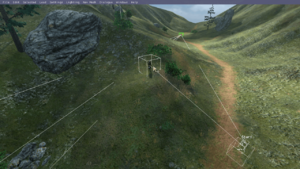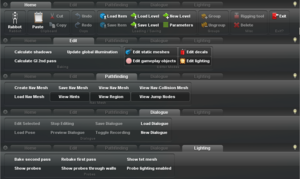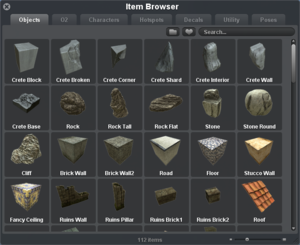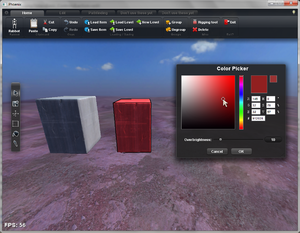Difference between revisions of "Editor Interface"
Silverfish (talk | contribs) m (→Save Selection: Tweaked title again.) |
Silverfish (talk | contribs) (→Home: Added table for all buttons in the home tab.) |
||
| Line 29: | Line 29: | ||
! Copy | ! Copy | ||
| cmd+c || Puts the selection into the clipboard. | | cmd+c || Puts the selection into the clipboard. | ||
| + | |- | ||
| + | ! Undo | ||
| + | | cmd+z || Undo the most recent action. | ||
| + | |- | ||
| + | ! Redo | ||
| + | | cmd+shift+z || Redo the most recent action. | ||
| + | |- | ||
| + | ! Load Item | ||
| + | | cmd+c || Opens the [[#item_browser|item browser]]. | ||
| + | |- | ||
| + | ! Save Item | ||
| + | | cmd+c || Opens a save dialog to [[#save_selected_objects|save selected objects]]. | ||
| + | |- | ||
| + | ! Load Level | ||
| + | | - || - | ||
| + | |- | ||
| + | ! Save Level | ||
| + | | cmd+s || Overwrites the current level with any changes. | ||
| + | |- | ||
| + | ! New Level | ||
| + | | - || - | ||
| + | |- | ||
| + | ! Parameters | ||
| + | | - || Opens the parameter editor for the loaded level. | ||
| + | |- | ||
| + | ! Group | ||
| + | | cmd+g || Groups the selected objects. | ||
| + | |- | ||
| + | ! Ungroup | ||
| + | | cmd+shift+g || Ungroups any selected groups. | ||
| + | |- | ||
| + | ! Rigging tool | ||
| + | | - || - | ||
| + | |- | ||
| + | ! Delete | ||
| + | | delete || Removes any selected objects. | ||
| + | |- | ||
| + | ! Exit | ||
| + | | alt+f4 || Closes the application. | ||
|} | |} | ||
Revision as of 13:20, 1 September 2015
![]() Work in Progress: Comments & Edits Welcome
Work in Progress: Comments & Edits Welcome
Contents
Introduction
This page details all the interface elements found in the Overgrowth level editor, which can be accessed by pressing 9 when in the game.
Note: A fair number of tools and functions are inaccessible from the editor interface, to find out how to access these, or if you're looking for a control/hotkey reference, go to the Control Reference.
Ribbon User Interface
The horizontal bar across the top of the window is called the ribbon. All editor functions can be found here with a few exceptions as some functions can only be reached via hotkeys for now.
Home
Contains the most common tools.
| Button | Hotkey | Effect |
|---|---|---|
| Rabbot | 8 | Enter play mode. |
| Paste | cmd+v | Pastes the clipboard on the cursor position. |
| Cut | cmd+x | Puts the selection into the clipboard and removes the selected objects. |
| Copy | cmd+c | Puts the selection into the clipboard. |
| Undo | cmd+z | Undo the most recent action. |
| Redo | cmd+shift+z | Redo the most recent action. |
| Load Item | cmd+c | Opens the item browser. |
| Save Item | cmd+c | Opens a save dialog to save selected objects. |
| Load Level | - | - |
| Save Level | cmd+s | Overwrites the current level with any changes. |
| New Level | - | - |
| Parameters | - | Opens the parameter editor for the loaded level. |
| Group | cmd+g | Groups the selected objects. |
| Ungroup | cmd+shift+g | Ungroups any selected groups. |
| Rigging tool | - | - |
| Delete | delete | Removes any selected objects. |
| Exit | alt+f4 | Closes the application. |
Edit
Contains tools more directly related to level editing.
Pathfinding
Tools for nav mesh generation, loading, saving and viewing.
Dialogue
Tools for dialogue editing.
Test
Contains an experimental tool for using the terrain to carve into objects.
Warnings
Just below the ribbon on the left side is a space for warnings. These warnings will tell you if the nav mesh, ambient occlusion or baked shadows needs to be updated.
Item Browser
The item browser is used to browse for items that can be spawned in the levels. It is brought up by pressing the Load Item button under the Home tab. To spawn an item, click it and then click in the world to create the item on that location.
This list does not necessarily contain all the objects that can be spawned as all objects need to be manually added to the list. A file browser can be brought up by pressing the folder icon just under the tabs at the top. That file browser can be used to try loading any xml file, which is useful if you're trying to load a custom object that has not been added to the item browser for instance. The types of items that can be spawned are objects (static models), characters, weapons, hotspots, decals and spawn points.
Along the top of the window there are tabs for different categories of items. In the bottom right there is a slider to change the size of the thumbnail images as well as a grip that can be clicked and dragged to resize the window. A search field that searches in the currently open tab is located under the tabs to the right.
Hovering your mouse cursor over a thumbnail image causes a heart icon to appear on the thumbnail. If that heart icon is pressed the object is added as a favorite. To sort out any object that is not a favorite from the view, press the heart button right under the tabs at the top of the window. The favorites do not persist between closing and opening the item browser.
Color Picker
The Color Picker is used to tint the color of selected objects. It is opened by pressing CTRL+P (For Mac users: Command+P). The color picker consists of a color-gradient box, a rainbow slider, two boxes of different sizes showing the basic chosen color, RGB values, a hex value, and an overbrightness slider. Increasing overbrightness makes the color brighter.
Save Selected Objects
Once you have created something you wish to use elsewhere, press Ctrl+Shift+S (On Windows) or Command+Shift+S (on Mac) to open an object saving dialog. This way, you can save buildings, trees or obstacle courses made from many parts as a single XML object, ready to be imported back to Overgrowth.



